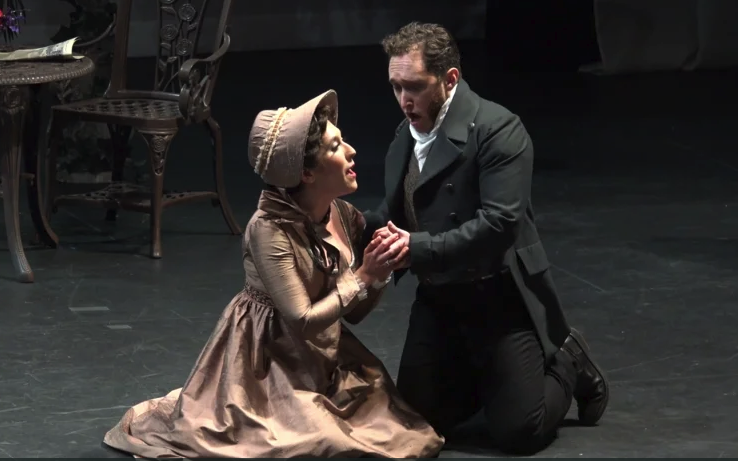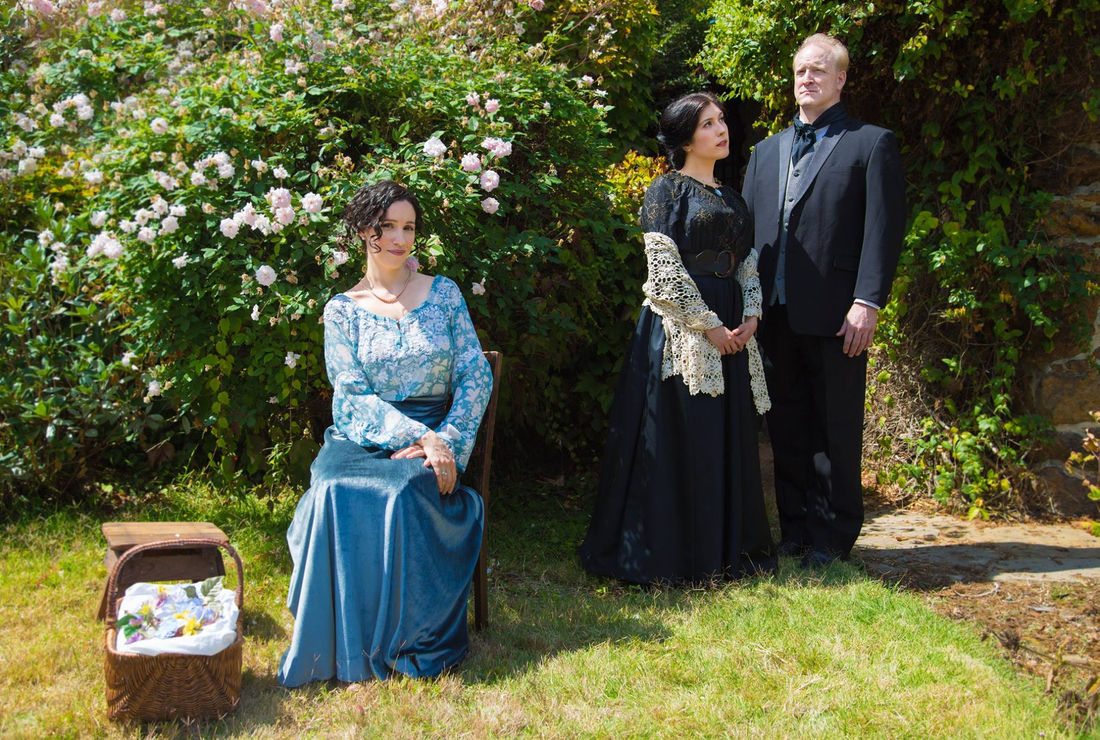Middlemarch in Spring is a major new chamber opera from the creative team of Allen Shearer, composer and Claudia Stevens, librettist. Shearer and Stevens’ goal is always to entertain, while pushing the boundaries of opera. Middlemarch in Spring is an opera full of delight and humor that is also thought-provoking and deeply moving.
Here is a video of librettist Claudia Stevens talking about Middlemarch in Spring, introduced by Michelle Krisel of Charlottesville opera. The interview continues here.
Here is a video of librettist Claudia Stevens talking about Middlemarch in Spring, introduced by Michelle Krisel of Charlottesville opera. The interview continues here.
Sara Duchovnay as Dorothea and David Margulis as Will in the Charlottesville Opera production
Middlemarch in Spring: one of the Top 10 Operatic Events of 2015
“Composer Allen Shearer and librettist Claudia Stevens deftly mined George Eliot’s novel for a sunny, ingratiating and altogether effective piece of musical theater at Z Space.” –Joshua Kosman, San Francisco Chronicle
Five-star review, San Francisco Examiner
‘Middlemarch’ – literature’s gift to opera
by Janos Gereben March 20, 2015
Rare triumph for a new opera Rating: * * * * *
How could 141 years pass without George Eliot’s “Middlemarch” being turned into an opera – what richer, more meaningful, always timely source is there?
The long wait is over with tonight’s premiere of “Middlemarch in Spring” in San Francisco’s Z Space, a delightful event marking the appearance of a rare phenomenon: a new opera of dramatic integrity, with music that’s both boldly contemporary and instantly accessible.
The husband-and-wife team of composer Allen Shearer and librettist Claudia Stevens did a splendid job. Special kudos to Stevens for keeping Eliot’s voice and the meandering story intact – and even enhanced – within the constraints of inevitable abbreviation and the demands of the stage. The number of characters is reduced, several story lines are omitted by necessity, but the opera brings the novel to life with uncanny mastery. With the chamber orchestra onstage (and becoming part of the action in a hilarious scene), under the baton of Jonathan Khuner, attention is divided between singers and instrumentalists, but Shearer’s music is such that even if the orchestra were hidden, the listener would be aware of it – and that’s a good thing.
Somewhat reminiscent of “The Rake’s Progress,” the orchestra here doesn’t accompany the singers, but is at variance with them in the manner of a concerto, voices vying with the orchestra, but in a friendly, supportive way.
Shearer’s music is pleasantly dissonant, with a sound that sticks in the ears and memory. It’s ambiguous music, seemingly wondering between keys, but landing securely each time. There is an element of choppiness in the first act, short phrases chasing each other, but the second act settles down, taking deeper breaths, and culminating in a memorable finale, an upbeat variation on the cast of “Don Giovanni” facing the audience.
With apologies to the wonderful cast, first credit should go to the musicians: pianist Karen Rosenak, violinists Barbara Riccardi and David Cheng, violist Stephanie Ng, pride-of-town cellist Thalia Moore, a (one) handful of woodwinds and brass, and multitasking percussionist Mckenzie Camp (of stentorian voice) all respond to Khuner’s direction with consistent excellence throughout the work’s two-hour length.
On stage – with Mathew Antaky’s simple and terrific set and lighting design; Jeremy Knight’s striking (but not distracting) projections; and Christine Crook’s period-perfect costumes – Sara Duchovnay’s Dorothea, Tonia D’Amelio’s Celia, Daniel Curran’s Ladislaw, Eugene Brancoveanu’s Chettam, Michael Mendelsohn’s Brooke, and – receiving a huge chorus of good-natured boos for making the tiresome evil Casaubon alive – the great bass Philip Skinner all shine individually and meld into a believable ensemble.
Phil Lowery is the stage director, not only moving the actors around well, but executing a third-wall surprise (which could have gone south easily) boldly and well as the orchestra participates in the election scene, arguing, shouting, and throwing vegetables at the politicians – it’s hilarious and fits into the piece, even such anachronistic bits as shouts of “Right on!”
Shearer had said while preparing the work that “It was very exciting to embark on this. Dorothea’s disastrous marriage, and how she later gives up her dreams to follow her heart–this is the stuff of opera. From it we constructed a dynamic arc. And it is not merely a love story. It plays out against a rigid class structure, greed, pettiness and political gridlock. It speaks to our own time.”
He met the challenge well, as did Stevens, who spoke of the task before her: “To bring this great novel to life as an opera for a modern audience is to relive it totally, rediscover its power and timeless eloquence.”
All done, all in. Kudos all around. There are only three performances left, on March 20-22.
Middlemarch in Spring given new productions
Charlottesville Opera gave Middlemarch in Spring its East Coast premiere March 23 and 24, 2017 at Charlottesville’s historic Paramount Theater coinciding with the Virginia Festival of the Book. See video clips from this fine production here.
And the University of Tennessee Opera Theatre mounted a new production April 13-15, 2018 at the Bijou Theatre in Knoxville.
An unexpected honor for Middlemarch in Spring
Encyclopedia Britannica counted it among the most newsworthy new musical works world-wide in its 2015 “Year-in-Review.”
George Eliot Review
A major new review appears in the UK in George Eliot Review, hailing Middlemarch in Spring as “a fine adaptation of Middlemarch which is also a work of originality and charm. Musically and dramatically this is a moving and enjoyable work which gives a concentrated expression of more of George Eliot’s novel than one might think possible in a brief, two-act opera.” – Delia Da Sousa Correa (Open University, UK), Michael Halliwell, University of Sydney. Read the full review here.
San Francisco Chronicle
Joshua Kosman’s review in the San Francisco Chronicle is titled “A happy offshoot of Middlemarch.” He writes, “…this two-act chamber work is such a light-hearted and buoyant creation that it’s hard not to walk away feeling that all’s right with the world…. Shearer’s score – tuneful, elegant and canny in its creation of musical character – furthers that notion. Working with striking concision, the composer helps us hear the inner nature of each of the characters, from Casaubon’s granitic self-regard to Celia’s charmingly bubbled-headed cheeriness.” Read the full review here.
“Composer Allen Shearer and librettist Claudia Stevens deftly mined George Eliot’s novel for a sunny, ingratiating and altogether effective piece of musical theater at Z Space.” –Joshua Kosman, San Francisco Chronicle
Five-star review, San Francisco Examiner
‘Middlemarch’ – literature’s gift to opera
by Janos Gereben March 20, 2015
Rare triumph for a new opera Rating: * * * * *
How could 141 years pass without George Eliot’s “Middlemarch” being turned into an opera – what richer, more meaningful, always timely source is there?
The long wait is over with tonight’s premiere of “Middlemarch in Spring” in San Francisco’s Z Space, a delightful event marking the appearance of a rare phenomenon: a new opera of dramatic integrity, with music that’s both boldly contemporary and instantly accessible.
The husband-and-wife team of composer Allen Shearer and librettist Claudia Stevens did a splendid job. Special kudos to Stevens for keeping Eliot’s voice and the meandering story intact – and even enhanced – within the constraints of inevitable abbreviation and the demands of the stage. The number of characters is reduced, several story lines are omitted by necessity, but the opera brings the novel to life with uncanny mastery. With the chamber orchestra onstage (and becoming part of the action in a hilarious scene), under the baton of Jonathan Khuner, attention is divided between singers and instrumentalists, but Shearer’s music is such that even if the orchestra were hidden, the listener would be aware of it – and that’s a good thing.
Somewhat reminiscent of “The Rake’s Progress,” the orchestra here doesn’t accompany the singers, but is at variance with them in the manner of a concerto, voices vying with the orchestra, but in a friendly, supportive way.
Shearer’s music is pleasantly dissonant, with a sound that sticks in the ears and memory. It’s ambiguous music, seemingly wondering between keys, but landing securely each time. There is an element of choppiness in the first act, short phrases chasing each other, but the second act settles down, taking deeper breaths, and culminating in a memorable finale, an upbeat variation on the cast of “Don Giovanni” facing the audience.
With apologies to the wonderful cast, first credit should go to the musicians: pianist Karen Rosenak, violinists Barbara Riccardi and David Cheng, violist Stephanie Ng, pride-of-town cellist Thalia Moore, a (one) handful of woodwinds and brass, and multitasking percussionist Mckenzie Camp (of stentorian voice) all respond to Khuner’s direction with consistent excellence throughout the work’s two-hour length.
On stage – with Mathew Antaky’s simple and terrific set and lighting design; Jeremy Knight’s striking (but not distracting) projections; and Christine Crook’s period-perfect costumes – Sara Duchovnay’s Dorothea, Tonia D’Amelio’s Celia, Daniel Curran’s Ladislaw, Eugene Brancoveanu’s Chettam, Michael Mendelsohn’s Brooke, and – receiving a huge chorus of good-natured boos for making the tiresome evil Casaubon alive – the great bass Philip Skinner all shine individually and meld into a believable ensemble.
Phil Lowery is the stage director, not only moving the actors around well, but executing a third-wall surprise (which could have gone south easily) boldly and well as the orchestra participates in the election scene, arguing, shouting, and throwing vegetables at the politicians – it’s hilarious and fits into the piece, even such anachronistic bits as shouts of “Right on!”
Shearer had said while preparing the work that “It was very exciting to embark on this. Dorothea’s disastrous marriage, and how she later gives up her dreams to follow her heart–this is the stuff of opera. From it we constructed a dynamic arc. And it is not merely a love story. It plays out against a rigid class structure, greed, pettiness and political gridlock. It speaks to our own time.”
He met the challenge well, as did Stevens, who spoke of the task before her: “To bring this great novel to life as an opera for a modern audience is to relive it totally, rediscover its power and timeless eloquence.”
All done, all in. Kudos all around. There are only three performances left, on March 20-22.
Middlemarch in Spring given new productions
Charlottesville Opera gave Middlemarch in Spring its East Coast premiere March 23 and 24, 2017 at Charlottesville’s historic Paramount Theater coinciding with the Virginia Festival of the Book. See video clips from this fine production here.
And the University of Tennessee Opera Theatre mounted a new production April 13-15, 2018 at the Bijou Theatre in Knoxville.
An unexpected honor for Middlemarch in Spring
Encyclopedia Britannica counted it among the most newsworthy new musical works world-wide in its 2015 “Year-in-Review.”
George Eliot Review
A major new review appears in the UK in George Eliot Review, hailing Middlemarch in Spring as “a fine adaptation of Middlemarch which is also a work of originality and charm. Musically and dramatically this is a moving and enjoyable work which gives a concentrated expression of more of George Eliot’s novel than one might think possible in a brief, two-act opera.” – Delia Da Sousa Correa (Open University, UK), Michael Halliwell, University of Sydney. Read the full review here.
San Francisco Chronicle
Joshua Kosman’s review in the San Francisco Chronicle is titled “A happy offshoot of Middlemarch.” He writes, “…this two-act chamber work is such a light-hearted and buoyant creation that it’s hard not to walk away feeling that all’s right with the world…. Shearer’s score – tuneful, elegant and canny in its creation of musical character – furthers that notion. Working with striking concision, the composer helps us hear the inner nature of each of the characters, from Casaubon’s granitic self-regard to Celia’s charmingly bubbled-headed cheeriness.” Read the full review here.
Celia (Tonia d'Amelio), Dorothea, and Casaubon (Philip Skinner) in the garden


